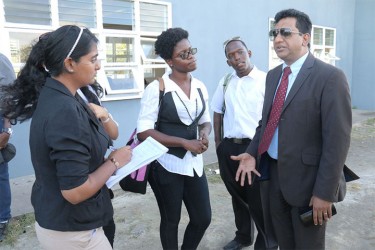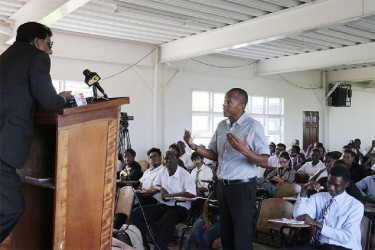Students of the University of Guyana (UG) Law Faculty are still uncertain about future studies at the Hugh Wooding Law School despite Legal Affairs Minister Anil Nandlall’s hopes that top graduates would continue to be allowed automatic entry.
Nandlall met with students at the Tukeyen Campus yesterday to brief them on the situation surrounding their admittance into the Hugh Wooding Law School, in light of the recent announcement of a decision to suspend the long established practice of guaranteeing entry.
On March 5th, Nandlall had announced that the Council of Legal Education (CLE), which presides

over legal education in the Caribbean, had taken the decision against guaranteeing a place at the institution to UG’s 2014 batch of law graduates. He subsequently said that local students looking to go to Hugh Wooding by writing the entrance examination would also be affected by the decision.
Packed in the front chairs of a lecture room at the Cheddi Jagan Lecture Theatre yesterday, around 100 students quietly listened to the minister as he clarified their situation. Since news about the decision broke, the students were not officially briefed on the current situation and their prospects, and therefore depended on information provided to them via media outlets, and hearsay.
Nandlall’s engagement yesterday was meant set the record straight so that the students, particularly those graduating in 2014, know where they stand. One student asked the minister why it took so long for someone to explain the situation to them. The Minister, said that there was no delay in releasing the information since the decision was taken by the CLE in February, and that he shared the development with the public shortly after.
Nandlall started at the beginning, recalling that the agreement which allowed UG’s 25 top-performing law students automatic entrance into Hugh Wooding started in the mid-nineties and continued until last year. The minister said that the agreement has seen many complications in its lifetime, with the recent decision to suspend the automatic entries being the latest. The first agreement lasted until 2012, after which another agreement, which covered 2013, was struck.
Hugh Wooding beyond capacity

He said that the recent decision with regard to UG was taken at a CLE meeting held earlier this year. The reason for the decision is that the Law school is beyond capacity and simply cannot accommodate additional students, whether from Guyana, or any other non-University of the West Indies (UWI) Campus.
Stabroek News understands that the overcrowding occurred after a decision to do away with the quota system which was created to limit and control the number of graduates admitted to the Council’s law school for training as lawyers. Under the quota system, a number of students from each participating territory was to be offered places in one of the Council’s law schools. In the case of Guyana, that law school is Hugh Wooding.
However, in 2009, UWI expanded its law degree programme and established three new, separate law faculties on its campuses in Jamaica, Barbados and Trinidad.
As a result, the number of students now admitted into the UWI law campuses has increased, and since UWI students enjoy the automatic right of entry into CLE law schools, the number of students which qualify for admission into Hugh Wooding has also increased substantially.
As things stand, all three UWI law schools are beyond capacity. Hugh Wooding in particular was constructed to house 180 students, but Stabroek News has learnt that over 600 students are on roll. Further, special provisions have been made to alleviate the strain placed on the school’s facilities and lecturers but with little change.
For the 2014/2015 academic year, Stabroek News has been informed that Hugh Wooding is expecting an influx of an additional 300 UWI law graduates and just cannot handle students from non-UWI campuses.
Nandlall explained to the students yesterday that principals of two of UWI’s law faculties presented these realities during the CLE meeting earlier this year, and said that when the issue of renewing the agreement with Guyana came to a vote, it was voted down.
Intervention efforts
He nevertheless promised to work towards a favourable resolution with the CLE. Nandlall noted that intervention on the part of the Government of Guyana (GoG) saw the issue being put on the agenda of the Caricom Heads of Government meeting, which was held this past Monday and Tuesday. Stemming from this meeting, a letter was written by Caricom Chairman Ralph Gonsalves to the CLE, asking that the agreement be continued. Nandlall said he is optimistic that Gonsalves’ request would produce a favourable, final result to the situation, and added that the hopes the results come before members of UG’s final year law class complete their LLB and are ready to move on to their LEC later this year.
Until such a final decision is arrived at, however, the minister said he hoped the CLE will allow the initial agreement, which allows for automatic entry of Guyana’s top 25 law graduates into Hugh Wooding, to continue.
It is uncertain when the CLE will meet to consider either Gonsalves’s or Nandlall’s requests, since the body is not slated to meet again until July. Meantime, CLE Chairman Jacqueline Samuels-Brown is slated to arrive in Guyana on Sunday and Nandlall said he intended to raise the issue with her then.
Certainty
While the law students welcomed the clarity provided by the minister, several noted that their futures are still uncertain. “We need certainty,” exclaimed one final year student. “In law the element of certainty is of utmost importance. You need to know here you stand and we still do not,” the student continued.
The same student said that while the minister’s words were comforting, they made her realise that the only certainty concerning the situation is that nothing is yet certain. Another student, during the question and answer segment of the engagement, noted the many problems Guyana’s students face with regard to acquiring their LEC at Hugh Wooding and asked the minister why the government has not yet moved to give the country its own law school.
Nandlall responded that he cannot remember why the idea was abandoned several years ago. He nevertheless told the students that such an undertaking would be financially and otherwise painstaking, and would take several years to accomplish. Even if such a school were set up, he continued, it would likely be erected under the CLE, since the body is already internationally recognised and respected.
Yet another student revealed that she is contemplating transferring to UWI’s law campus in Barbados so as to qualify for the automatic entry, even though she may be required to repeat her second year. Students will also have the option of pursuing their LEC in the Bahamas, but tuition at the Eugene Dupuch Law School in the Bahamas is US$10, 000 a year, which is beyond the reach of some students.







